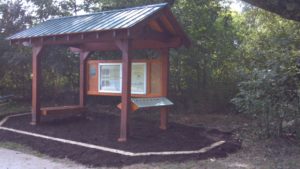 This project was born out of a brain storming session during a board meeting of the Forsyth County Master Naturalists. The Anuran Monitoring project had just been undertaken and questions were being raised about what could the Master Naturalists do to help. The Tree Sign project has been well accepted by the public and a suggestion was made to install frog signs. Pros and cons were discussed and the conversation rapidly moved to a kiosk devoted to information about frogs and the Anuran project. The kiosk idea quickly grew into a Learning Center kiosk concept that could include educational information on a wide range of environmental topics. The Learning Centers will feature permanent displays as well as some that are seasonal or temporary. The kiosks are designed to provide educational information on environmental and ecosystem topics that will help individuals gain an understanding of our native ecosystems and how to protect and maintain them. Additionally, the kiosks can also be used as an extended classroom for environmental and ecosystem learning activities.
This project was born out of a brain storming session during a board meeting of the Forsyth County Master Naturalists. The Anuran Monitoring project had just been undertaken and questions were being raised about what could the Master Naturalists do to help. The Tree Sign project has been well accepted by the public and a suggestion was made to install frog signs. Pros and cons were discussed and the conversation rapidly moved to a kiosk devoted to information about frogs and the Anuran project. The kiosk idea quickly grew into a Learning Center kiosk concept that could include educational information on a wide range of environmental topics. The Learning Centers will feature permanent displays as well as some that are seasonal or temporary. The kiosks are designed to provide educational information on environmental and ecosystem topics that will help individuals gain an understanding of our native ecosystems and how to protect and maintain them. Additionally, the kiosks can also be used as an extended classroom for environmental and ecosystem learning activities.
The first Learning Center kiosk has been constructed and is located at Fowler Park. There are plans for more to follow at other locations. A solar panel is to be added in the near future for demo purposes and possibly to provide power for other uses.
Each kiosk will have a central theme. The Fowler Park kiosk is focused on frogs. The Forsyth County Master Naturalists have teamed up with the Forsyth County Anuran Monitoring program to monitor monthly, multiple locations on the Greenway. Monitoring trails are identified by stencils of frogs along the trail. Data will be collected, recorded and sent to the Anuran Frog monitoring database by teams of Master Naturalists.
Future kiosk themes will cover such subjects as recycling, water quality, water conservation, soil conservation, non-native invasive plants and animals, and other environmental subjects.
As citizen scientists the Forsyth County Master Naturalists are dedicated to providing unbiased information in efforts to teach and promote environmental best practices that will have an effective impact on ecosystems and wildlife habitats in our area.

